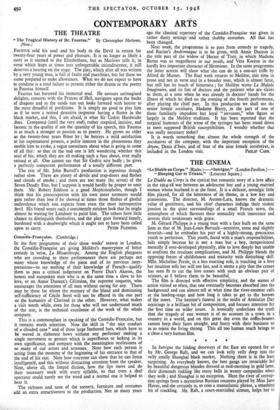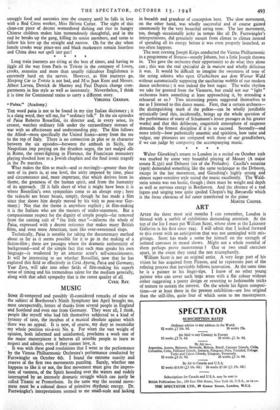THE CINEMA
"Le Diable au Corps." (Rialto.)—"Intrigue." (London Pavilion.)— "Sleeping Car to Trieste." (Leicester Square.)
Le Diable au Corps is the cynical but romantic story of a love affair in the 1914-18 war between an adolescent boy and a young married woman whose husband is at the front. It is a delicate, nostalgic little film played, for all the bitterness of its theme, in a low key and pianissimo. The director, M. Autant-Lara, knows the dramatic value of gentleness, and his chief characters indulge their violent passion in the quiet surroundings of a small French town, the atmosphere of which flavours their sensuality with innocence and invests their weaknesses with grace.
M. Gerard Philippe is a young man with a face built on the same lines as that of M. Jean-Louis Barrault—sensitive, tense and slightly feverish—and he embodies his part of a highly-strung, precocious youth to perfection. This youth, faced with a man's responsibilities, fails simply because he is not a man but a boy, inexperienced mentally if over-developed physically, able to love deeply but unable to confront the resultant complications, and M. Philippe blends the opposing forces of childishness and maturity with disturbing skill. Mlle. Micheline Presle, in a less exacting role, is touching in a love her intuition tells her will not last, and it seems a pity that the censor has seen fit to cut the love scenes with such an obvious pair of scissors, as I believe them to be beautiful.
The film is directed with effective simplicity, and the scenes of action visited so often, that one eventually becomes absorbed into the background and can almost tell at what time the river-steamer calls at the landing-stage and how long it takes to get to the bottom of the street. The heroine's funeral in the midst of Armistice Day rejoicings is a brilliant bit of composition, and focuses attention for the first time on wider issues. It ironically underlines the truth that the tragedy of one woman is of no account in a town in a country in a world, and on this great day even the coffin-bearers cannot keep their faces straight, and hurry with their business so as to rejoin the living throng. This all too human touch brings to a close a very human film.
* * * *
In Intrigue the folding doorways of the East are opened for us by Mr. George Raft, and we can look velly velly deep into the velly smelly Shanghai black market. Nothing there is in the least surprising. As everybody knows, the best gangs are invariably led by beautiful dangerous blondes dressed at mid-morning in gold lame, their diamonds tinkling like teeny bells in weeny campaniles when they walk ; and Shanghai is no exception. Here the river of corrup- tion springs from a mysterious Russian countess played by Miss June Havoc, and she certainly is, to coin a transatlantic phrase, a smashing bit of crackling. Mr. Raft, a court-martialled airman, helps her to
smuggle food and narcotics into the country until he falls in love with a Red Cross worker, Miss Helena Carter. The sight of this clean-cut piece of decent womanhood dishing out rice to hungry Chinese children makes him tremendously thoughtful, and in the end he breaks up the gang, killing its senior members, and turns to follow his love up the straight and narrow. Oh for the day when female crooks wear pince-nez and black marketeers remain heartless and China does not spell intfgue !
* * * *
Long train journeys are tiring at the best of times, and having to jiggle all the way from Paris to Trieste in the company of lovers, crooks, assassins and more than usually ridiculous Englishmen is extremely hard on the nerves. However, as film journeys go, Sleeping Car to Trieste is not bad, and Miss Jean Kent and Messrs. Albert Lieven, Derrick de Niamey and Paul Dupuis change com- partments in fine style as well as incessantly. Nevertheless, I think it is time for Continental trains to carry a different story.
VIRGINIA GRAHAM.



































 Previous page
Previous page